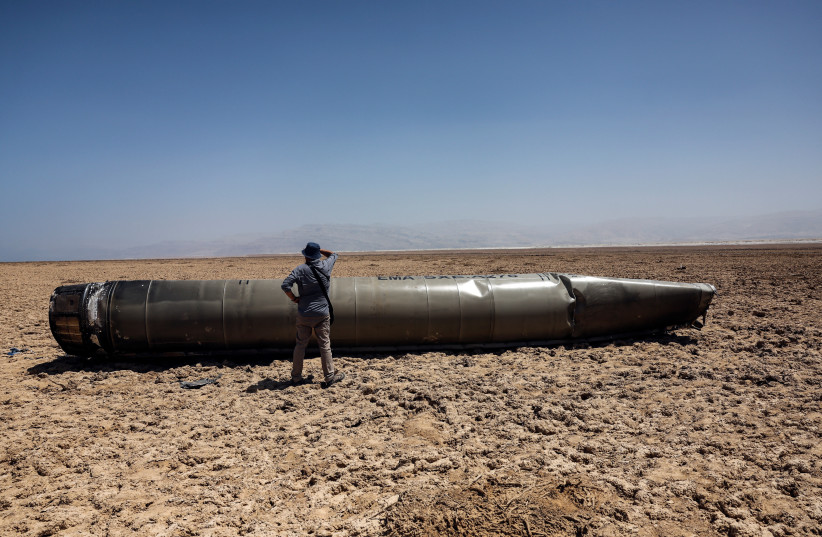In his speech to the United States Congress on July 24, 2024, Israel's prime minister Bejamin Netanyahu presented a vision for the Middle East, which he dubbed the “Abraham Alliance.”
According to Netanyahu’s vision, the USA and Israel would establish a regional security alliance, standing together to counter the threat posed by Iranian regime and its terrorist proxies across the Middle East. Countries in the region that have already established diplomatic relations with Israel will be invited to join the alliance, as would be any others that do so in the future.
In his address, Netanyahu observed that Israel saw the potential inherent in a regional security alliance on the night of April 14, when “half a dozen nations worked alongside Israel” to help neutralize Iran’s missile attack against Israel. The aim of such a regional alliance—to unite the moderates in the Middle East against Iran—is inspired, according to Netanyahu, by the alliance formed by the United States with European countries after World War II in face of the geopolitical threat posed by the Soviet Union.
This same aftermath of World War II also provided inspiration for Netanyahu with regard to an equally pressing matter: Israel’s relations with the Palestinians. One of the Allies’ great successes, orchestrated by the United States, was to take advantage of their overwhelming military victory over Japan and Germany in turning the two into prosperous, secure, and peaceful countries. Importantly, both countries had been promised the prospect of prosperity, security and independence before the end of the war—for Germany with the Atlantic Treaty of 1941, and for Japan with the Potsdam Declaration of 1945.

After Germany and Japan’s surrender, the Allied Nations acted with determination and consistency in investing resources into rehabilitating the countries, thus guaranteeing their transition into independent and prosperous entities. They also invested in deradicalizing the defeated countries, by way of revising the content of the educational systems’ curriculums and rebuilding their governmental structures and institutions, among other initiatives. In parallel, the countries of Europe realized that they need to act in consort if they were to prevail against the enemies of freedom and democracy. This understanding formed the foundations for what ultimately became the European Union.
Making history reality
There is more to Netanyahu’s vision for Gaza and the Palestinians in terms of the aftermath of World War II. Transposing the principles of the Postdam Declaration to the present day, Netanyahu declared that the current war would end as soon as Hamas surrenders, lays down its weapons, and returns the hostages; sovereignity over the Gaza Strip will pass to the Palestinians once it becomes clear that they are able to establish a moderate government that does not seek to annihilate Israel; and the Palestinians would thereafter enjoy a future of security, prosperity, and peace.
So why hasn’t any of this happened?
First, October 7 was a shocking event on a regional scale. It became clear to the moderate countries in the region that Hamas, as a pro-Iranian militia, poses a risk to the stability of the entire Middle East. That is why the meeting of their interests came together at this point in time and not before. Indeed, Israel is receiving backing from them—whether explicit or implicit—for the ongoing war against Hamas.
Second, Israeli discourse around a vision or grand-strategy in recent years was limited to the question of “yes” or “no” to the establishement of a Palestinian state. Once we broaden our view to the entire Middle East, as Netanyahu did when he warned the world against Iran and with the Abraham Accords, it becomes clear that Israel’s security is tied to the creation of a regional alliance of moderates against jihadists. Understanding that this is the key issue, clarifies that the question as regards to the Palestinians is whether they will take the side of the moderates or of the jihadists.
If the Palestinians join the moderate axis, the military victory over Hamas will turn into a long-term reality of security, stability, and peace. History shows that in order to encourage them to do so, the Palestinians must be assured that renouncing the path of violence will, in due course, lead to a future of prosperity, security, and independence for them—in other words, the existence of a peaceful Palestinian state alongside Israel.
Now is the time to come together and act with a shared objective: the establishment of a regional security alliance with moderate forces in the Middle East. Such an alliance could become a magnet for the peoples and countries of the region who are seeking to abandon the way of violence and terror. It is possible and it is in our hands.
The authors, professors at Tel Aviv University, are the co-founders of the “Day After the War Forum” and the leaders of “The Israeli Interest – A Regional Security Alliance” Movement.
